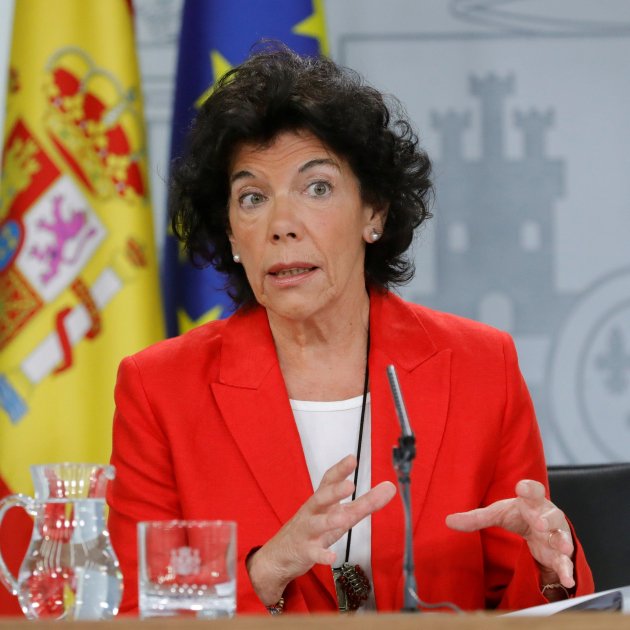After this week's tempestuous plenary session in the Catalan Parliament, the Spanish government has decided to send a warning to the independence movement. "If the Parliament takes decisions contrary to the Constitution, we will act in consequence and we'll defend [it]", said the government spokesperson, Isabel Celaá, in her press conference after today's cabinet meeting. This followed JxCat and ERC agreeing a solution this Thursday to guarantee the rights of the pro-independence deputies in prison or exile.
Celaá's warning was similar to the one from the Spanish government's delegate to Catalonia, Teresa Cunillera, this Friday morning. She recalled that judge Pablo Llarena's order "says what it says", for which reason she urged them to nominate substitutes so that the Parliament can function normally.
Celaá, meanwhile, said that "the independence movement is suffering an important crisis" which is "dragging Catalonia down". She accused it of "obstructing and paralysing" the Catalan government and preventing the Parliament from functioning normally. "They're stopping questions which affect all citizens, questions from the social agenda," she said. She insisted that Pedro Sánchez's government "is going to defend the law in Catalonia and in all its institutions, let there be no doubt".
In reference to the ultimatum president Quim Torra gave during the general policy debate, the spokesperson said that great care is need with both ultimatums and rhetoric. For that reason she called for everyone to stop with "insinuations which are undesirable when it comes to reaching agreements" and asked them "do you want to solve the conflict? Yes or no?".
Middle ground
Celaá didn't want to give further details over what she meant by "act in consequence". Asked whether that means using article 155 of the Spanish Constitution again to intervene in Catalonia, she said no. "Between the perpetual 155 we were asked for as soon as we took office and rupture and conflict, there's a wide space to agree, to negotiate and to incorporate rationality," she argued.
On the other hand, she also asked PP and Ciudadanos to support dialogue like the government has. "In the same way that PSOE was involved with government business when Rajoy was leading, now they should do the same to give a united response with the government, in the framework of dialogue and the law," she said.
"We have the obligation to keep patiently looking for solutions", Celaá said, adding that this "realistic" path is already bearing fruit with its bilateral approach. "The independence movement doesn't have the solution for Catalonia and, as it doesn't have it, we've got to look for it together," she said.
Franco and Billy El Niño
Asked about the intention of Franco's family to reinter him with military honours, the spokesperson would only say they're still in discussions. The government plans to exhume the dictator before the end of this year.
Celaá was also asked about the presence of Billy el Niño at a Madrid Police ceremony this week. Billy el Niño (Billy the Kid, in English), real name Antonio González Pacheco, was a police officer during the Franco era who has been accused by an Argentinian court of involvement in torture. The minister said that "he's a free citizen who can attend any place he's been invited to".
Finally, the new Spanish government underlined its determination to pass its own budget for 2019. "The government hopes to approve its budget and continue with its work, which is being valued by the public," she said.
